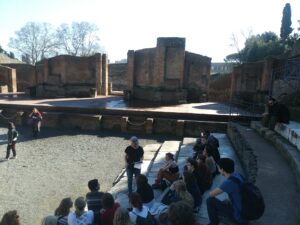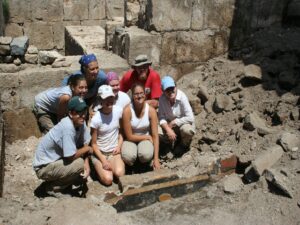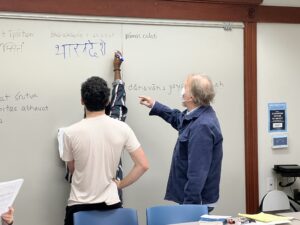Majors & Minors
The Classical Mediterranean and Middle East Department offers three major tracks: Classical Civilization, Classical Archaeology, and Classical Language. Each concentration offers a focus on different disciplines within Classical education while still preparing students with the necessary skills and knowledge to interact with the study of Classics as a whole. Students should work closely with their advisors to develop an educational plan that works best for them.
Follow these links for more information on language tracks and placement, study away opportunities, or honors program information.
General Education Requirements
Courses that meet the general education requirements in writing, quantitative thinking, internationalism and U.S identities and differences will be posted on the Registrar’s web page in advance of registration for each semester, as these are subject to change depending upon the course offerings each term. Additional information regarding the general distribution requirement and the general education requirements can be found in the graduation requirements section of this catalog.
CMME courses which fulfill Macalester Distribution Requirements:
Humanities:
All regular courses in the Department of the Classical Mediterranean and Middle East count toward the general distribution requirement in humanities except for elementary and intermediate language courses, CLAS 260, CLAS 270 and CLAS 283.
Social Sciences: CLAS 270
Classical Civilization:

The Classical Civilization concentration unifies the study of Classics with Ancient History. This concentration emphasizes the ability to work with different types of evidence surviving from antiquity, including both literary texts and material culture, and analyzes the transformations of culture, religion, and empires throughout time. Students in the Classical Civilization Major are welcome to study any of the four Classical languages, but are encouraged to select the language most closely related to the primary materials of the region/time period which interest them most. The Classical Civilization Major is highly interdisciplinary, and as such we encourage students to pursue coursework in other departments such as Religious Studies, Art History, and History. Requirements for the Classical Civilization Major can be found below.
A major with an emphasis in Classical Civilization consists of at least ten courses and a study away experience. Courses must include:
a) CLAS 101 – The Classical Mediterranean and Middle East
b) a context course providing a deep historical perspective on the classical periods of the Mediterranean and Middle East. These courses are numbered 121-391 in the department, and exclude language courses taken to satisfy the language requirement:
- CLAS 121 – The Greek World
- CLAS 122 – The Roman World
- CLAS 127 – Women, Gender and Sexuality in Ancient Greece and Rome
- CLAS 129 – Greek Myths
- CLAS 130 – Early Arab and Persian Empires
- CLAS 135 – India and Rome
- CLAS 145 – Pagans, Christians and Jews in Classical Antiquity: Cultures in Conflict
- CLAS 155 – January in Rome: The Art, Archaeology, and Urban History of Ancient Rome
- CLAS 200 – Ancient and Medieval Philosophies
- CLAS 220 – Ancient Healing and Medicine
- CLAS 260 – Introduction to Art History I: From Prehistory to the Medieval Period
- CLAS 283 – Art and Architecture of Ancient Greece and Rome
Occasionally courses may be counted from courses of other departments or from study abroad programs that survey classical periods of Mediterranean and/or Middle Eastern history. Pre-approval must be obtained from the chair of the department and noted in DegreeWorks.
c) study in a classical language to include at least one course at the intermediate level (Greek, Latin, Hebrew or Arabic);
d) a course that includes a major research project prior to the Senior Seminar,
e) CLAS 490 – Senior Seminar
f) and electives chosen from the offerings of the department. Select courses from other departments may be substituted when approved in advance by the Department of the Classical Mediterranean and Middle East. Please have this approval noted in DegreeWorks.
For an example course plan, see Advisor Reference (Classical Civilization Major)
Classical Archaeology:

Archaeology is intrinsically tied to many other fields of study, such as Anthropology, History, Religion, Art History, and Geology. As such, there are many different types of archaeology: Classical Archaeology concentrates on the ancient Greek and Roman cultures and the peoples with whom they interacted, including those across the ancient Mediterranean and Middle East. Biblical or Near Eastern Archaeology focuses on the material remains of the ancient Middle East as a region of great cultural diversity. Anthropological Archaeology explores the material remains of past peoples within the conceptual and methodological framework of Anthropology. Often this entails focusing on prehistoric societies or societies outside the ancient Mediterranean and Middle Eastern spheres, such as the pre-modern peoples of the Americas and Asia. A background in archaeology can also pave the way for a career in museums or cultural resource management.
It is recommended that students wishing to pursue graduate study in Anthropological Archaeology should consider majoring in Anthropology but taking relevant offerings in Geology and certain Classical Archaeology courses in the Classical Mediterranean and Middle East.
The Classical Archaeology Major requires a deep knowledge of the cultural and historical contexts of material remains. Thus, we encourage students to study the historical framework of the Ancient Mediterranean, and pursue coursework in other departments such as Religious Studies, Art History, and History. Requirements for the Classical Civilization Major can be found below.
A major with an emphasis in Classical Archaeology consists of at least ten courses, a study away experience and a field experience. Courses are to include:
a) CLAS 101 – The Classical Mediterranean and Middle East
b) a context course providing a deep historical perspective on the classical periods of the Mediterranean and Middle East.
These courses are numbered 121-391 in the department, and exclude language courses taken to satisfy the language requirement:
- CLAS 121 – The Greek World
- CLAS 122 – The Roman World
- CLAS 127 – Women, Gender and Sexuality in Ancient Greece and Rome
- CLAS 129 – Greek Myths
- CLAS 130 – Early Arab and Persian Empires
- CLAS 135 – India and Rome
- CLAS 145 – Pagans, Christians and Jews in Classical Antiquity: Cultures in Conflict
- CLAS 155 – January in Rome: The Art, Archaeology, and Urban History of Ancient Rome
- CLAS 200 – Ancient and Medieval Philosophies
- CLAS 220 – Ancient Healing and Medicine
- CLAS 260 – Introduction to Art History I: From Prehistory to the Medieval Period
- CLAS 283 – Art and Architecture of Ancient Greece and Rome
Occasionally courses may be counted from courses of other departments or from study abroad programs that survey classical periods of Mediterranean and/or Middle Eastern history. Pre-approval must be obtained from the chair of the department and noted in DegreeWorks.
c) study in a classical language to include at least one course at the intermediate level (Greek, Latin, Hebrew or Arabic)
d) CLAS 223 – Introduction to Archaeology
e) a course which includes a major research project prior to the Senior Seminar
f) CLAS 490 – Senior Seminar, and
g) electives from the following, or a course otherwise approved in advance by the department:
- CLAS 155 – January in Rome: The Art, Archaeology, and Urban History of Ancient Rome
- CLAS 260 – Introduction to Art History I: From Prehistory to the Medieval Period
- CLAS 270 – Cultural Resource Management
- GEOL 165 – History/Evolution of Earth
- GEOL 260 – Geomorphology
- GEOL 265 – Sedimentology/Stratigraphy
- GEOL 300 – Paleobiology
- ANTH 112 – Archaeology and Human Origins
- ANTH 340 – Human Evolution
- language courses from the department offerings beyond those used to meet requirement c).
Archaeology majors must also gain some form of field experience, such as participating in an excavation, interning in a museum, or pursuing study away that involves archaeological learning in an archival, laboratory or field context.
For an example course plan, see Advisor Reference (Classical Archaeology Major).
Classical Languages:

Traditionally, the study of Classics has focused primarily on the languages of Greece and Rome, but Macalester is proud to offer a broader definition of what a classical language can be. We offer courses in Greek, Latin, Hebrew, and Arabic, and students are encouraged to select the languages which best suit their long-term goals. Students interested in pursuing graduate studies should focus primarily on the acquisition of the ancient languages of Greek and Latin, but more flexibility is offered to students less interested in continuing on to graduate programs. For example, Hebrew or Arabic can be substituted for either language. Requirements for the Classical Languages Major can be found below.
A major with an emphasis in Classical Languages consists of at least ten courses and a study away experience. Courses must include:
a) CLAS 101 – The Classical Mediterranean and Middle East
b) a context course providing a deep historical perspective on the classical periods of the Mediterranean and Middle East. These courses are numbered 121-191 in the department:
- CLAS 121 – The Greek World
- CLAS 122 – The Roman World
- CLAS 127 – Women, Gender and Sexuality in Ancient Greece and Rome
- CLAS 129 – Greek Myths
- CLAS 130 – Early Arab and Persian Empires
- CLAS 135 – India and Rome
- CLAS 145 – Pagans, Christians and Jews in Classical Antiquity: Cultures in Conflict
- CLAS 155 – January in Rome: The Art, Archaeology, and Urban History of Ancient Rome
- CLAS 200 – Ancient and Medieval Philosophies
- CLAS 220 – Ancient Healing and Medicine
- CLAS 260 – Introduction to Art History I: From Prehistory to the Medieval Period
- CLAS 283 – Art and Architecture of Ancient Greece and Rome
Occasionally courses may be counted from courses of other departments or from study abroad programs that survey classical periods of Mediterranean and/or Middle Eastern history. Pre-approval must be obtained from the chair of the department and noted in DegreeWorks.
c) seven courses involving classical languages and literatures in the original language (Greek, Latin, Hebrew or Arabic). Courses must be taken in at least two different languages and involve at least one class at the advanced level.*
d) a course which includes a major research project prior to the Senior Seminar
e) CLAS 490 – Senior Seminar.
* Seven courses in Arabic or six courses in Arabic plus an additional context course fulfills these requirements.
For an example course plan, see Advisor Reference (Classical Languages Major)
Middle Eastern Studies and Islamic Civilization
Some Classics students may consider declaring a Middle Eastern Studies and Islamic Civilizations concentration as a part of their Major track at Macalester. MESIC is an interdisciplinary concentration which invites students from a variety of majors to engage with the broader Islamic world, and may be a good fit for students with an academic interest studying the religions, economies, cultures, histories, and literatures of the Middle East more in-depth.
Minor Requirements
A minor with an emphasis in Classical Civilization consists of five courses to include: a) one context course providing a deep historical perspective on the classical periods of the Mediterranean and/or Middle East (CLAS 121 – The Greek World; CLAS 122 – The Roman World; CLAS 127 – Women, Gender and Sexuality in Ancient Greece and Rome; CLAS 129 – Greek Myths; CLAS 130 – Early Arab and Persian Empires; CLAS 135 – India and Rome; CLAS 145 – Pagans, Christians and Jews in Classical Antiquity: Cultures in Conflict; CLAS 155 – January in Rome: The Art, Archaeology, and Urban History of Ancient Rome; CLAS 200 – Ancient and Medieval Philosophies; CLAS 220 – Ancient Healing and Medicine; CLAS 260 – Introduction to Art History I: From Prehistory to the Medieval Period; CLAS 283 – Art and Architecture of Ancient Greece and Rome) and b) four other courses from the offerings of the department.
A minor with an emphasis in Classical Archaeology consists of five courses to include: (CLAS 121 – The Greek World; CLAS 122 – The Roman World; CLAS 127 – Women, Gender and Sexuality in Ancient Greece and Rome; CLAS 129 – Greek Myths; CLAS 130 – Early Arab and Persian Empires; CLAS 135 – India and Rome; CLAS 145 – Pagans, Christians and Jews in Classical Antiquity: Cultures in Conflict; CLAS 155 – January in Rome: The Art, Archaeology, and Urban History of Ancient Rome; CLAS 200 – Ancient and Medieval Philosophies; CLAS 220 – Ancient Healing and Medicine; CLAS 260 – Introduction to Art History I: From Prehistory to the Medieval Period; CLAS 283 – Art and Architecture of Ancient Greece and Rome); b) CLAS 223 – Introduction to Archaeology; and c) three other archaeology electives offered or approved by the department. (See under Major in Classical Archaeology for a full list.)
A minor with an emphasis in Classical Languages consists of five courses to include: (CLAS 121 – The Greek World; CLAS 122 – The Roman World; CLAS 127 – Women, Gender and Sexuality in Ancient Greece and Rome; CLAS 129 – Greek Myths; CLAS 130 – Early Arab and Persian Empires; CLAS 135 – India and Rome; CLAS 145 – Pagans, Christians and Jews in Classical Antiquity: Cultures in Conflict; CLAS 155 – January in Rome: The Art, Archaeology, and Urban History of Ancient Rome; CLAS 200 – Ancient and Medieval Philosophies; CLAS 220 – Ancient Healing and Medicine; CLAS 260 – Introduction to Art History I: From Prehistory to the Medieval Period; CLAS 283 – Art and Architecture of Ancient Greece and Rome); b) four other courses from the Greek, Latin, Hebrew and/or Arabic offerings of the department, including at least one at the intermediate level.
For an example course plan, see Advisor Reference (Classics Minor)